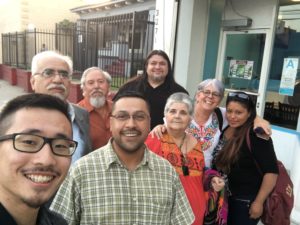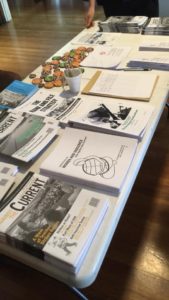Promise Li
June 27, 2018
The Solidarity West Coast Day School, which focused on the theme of ‘Transnational Solidarity with Latin America’, was held at the Los Angeles Worker Center on Saturday June 23. The event brought together around 30 people – organizers, workers, and activists from Los Angeles, Mexico, and El Salvador – to share their experiences on topics from Baja California strikes to news and updates on Venezuela and Cuba. Throughout the planning process and during the event, Solidarity was able to engage with local socialist groups like LeftRoots, LA CoIL, and DSA, and to build a deeper relationship with Latin American solidarity groups like CISPES (Committee in Solidarity with the People of El Salvador) and Raices sin Fronteras.
 The event began with a panel on the theme of ‘Solidarity Campaigns in Latin America’. This first panel featured two speakers, Jeanette Charles from Witness for Peace, Venezuelanalysis, Chiapas Support Committee, and other groups, and Henry Prudencio, a recent immigrant from El Salvador and CISPES organizer. Charles’ presentation focused on the revolutionary models of Cuba and Venezuela with an emphasis on people power, African diasporic traditions, and a reparations-based economic lens. Prudencio briefly discussed the history of U.S. intervention in El Salvador, the country’s current conditions, and paths for solidarity.
The event began with a panel on the theme of ‘Solidarity Campaigns in Latin America’. This first panel featured two speakers, Jeanette Charles from Witness for Peace, Venezuelanalysis, Chiapas Support Committee, and other groups, and Henry Prudencio, a recent immigrant from El Salvador and CISPES organizer. Charles’ presentation focused on the revolutionary models of Cuba and Venezuela with an emphasis on people power, African diasporic traditions, and a reparations-based economic lens. Prudencio briefly discussed the history of U.S. intervention in El Salvador, the country’s current conditions, and paths for solidarity.
An interactive discussion on issues around borders and immigration followed, headed by Lucila Conde and Louie Gomez, from Solidarity and Raices sin Fronteras; Silvia Brandon-Perez, from People without Border Temple, The Oscar Romero and Simone Weil Catholic Worker House, Solidarity, and other groups; Jessica Gomez, from Human Rights Alliance for Child Refugees and Families; and Leon Fierro, via Zoom software, a Mexicali Resiste member leading the fight against water privatization in Baja California who has been unjustly arrested and imprisoned for violence against the police during an action. The conversation touched on many topics, from workers resistance to water privatization and Fierro’s case in Baja California to anti-imperialist frameworks around border solidarity.
 The program concluded with a panel on indigenous struggles and activism, moderated by Robert Caldwell, member of Solidarity’s national committee and an indigenous organizer based in Texas and Louisiana. It featured Edgard Sanchez, member of Mexico’s PRT who worked with indigenous Zapatista presidential candidate Marichuy’s campaign; and Carmen Marta, from The Alliance of National, State and Municipal Organizations for Social Justice from San Quintin, Baja California. This panel addressed the importance of centering indigenous struggles throughout the continent. Sanchez spoke about the importance of Marichuy’s campaign, who was the first indigenous candidate running for Mexico’s presidency, and Marta spoke about the farmworkers in Baja California, many of whom are indigenous, and their struggles and strikes against Driscoll Berries’ exploitation and racism. After the program, a smaller group of speakers and Solidarity members met and continued discussing the current situation and politics in Mexico over an informal dinner.
The program concluded with a panel on indigenous struggles and activism, moderated by Robert Caldwell, member of Solidarity’s national committee and an indigenous organizer based in Texas and Louisiana. It featured Edgard Sanchez, member of Mexico’s PRT who worked with indigenous Zapatista presidential candidate Marichuy’s campaign; and Carmen Marta, from The Alliance of National, State and Municipal Organizations for Social Justice from San Quintin, Baja California. This panel addressed the importance of centering indigenous struggles throughout the continent. Sanchez spoke about the importance of Marichuy’s campaign, who was the first indigenous candidate running for Mexico’s presidency, and Marta spoke about the farmworkers in Baja California, many of whom are indigenous, and their struggles and strikes against Driscoll Berries’ exploitation and racism. After the program, a smaller group of speakers and Solidarity members met and continued discussing the current situation and politics in Mexico over an informal dinner.
The Day School is influenced and inspired by the efforts of Latinx organizers and other supporters, who have been working hard to develop these links of solidarity across borders long before this event. We hope this opportunity last weekend can continue to help bridge connections and stimulate more discussions and works of solidarity between left groups and other organizations in the U.S. and in Latin American countries. The effects of U.S. imperialism and global neoliberalism on the working class, indigenous, women, refugees, especially in Latin American countries, are deleterious. We also hope that Solidarity members, sympathizers, and branches in the West Coast can continue developing more educational and solidarity programs to support and uplift the struggles of workers and marginalized populations internationally.
